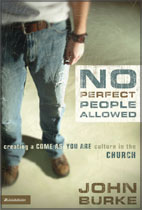Trust, Tolerance, Truth, Brokenness, and Aloneness
 TRUST is the first of the five leading struggles of the postmodern generation, according to chapter two of John Burke's book, "No Perfect People Allowed."
TRUST is the first of the five leading struggles of the postmodern generation, according to chapter two of John Burke's book, "No Perfect People Allowed."Burke attributes the birth of the "Postmodern Experiment" to the "Me Generation" that preceded it. Characterized by "The Sexual Revolution", skyrocketing divorce rates, latchkey kids, kids being forced to grow up into adulthood too soon, etc., "Americans went out for a three-decade binge on self, and now our country is vomiting up the consequences uncontrollably." (Page 32)
Postmodernists suffer from understandable trust issues that can only be properly addressed by the faithfulness of God as seen in trustworthy Christ followers and congregations.
 TOLERANCE is the second leading struggle for postmodernists, and Burke warns, "Christian leaders must understand the stereotype we fight against." (Page 40)
TOLERANCE is the second leading struggle for postmodernists, and Burke warns, "Christian leaders must understand the stereotype we fight against." (Page 40)Many Christians may not be intolerant but we must wrestle with the perception that we are nonetheless. We can stand for truth, which we must, but our presentation and our personal relationships must be without judgmentalism.
As one woman said when asking about visiting Burke's church, "I just need to know you're not one of those hateful churches." (Page 38)
"The attitude of the church culture will either convey the person of Christ and his attitude, which was outrageously accepting of and attractive to the 'sinners' of his day, or our attitudes toward others will reinforce a stereotype that does a disservice to Jesus." (Page 40)
Burke quotes Romans 2:4, which highlights the tolerance of God, as our model. "Do you show contempt for the riches of his kindness, tolerance and patience, not realizing that God's kindness leads you towards repentance!"
 TRUTH. "A national survey taken by Barna Research revealed that only one-third of Americans believe moral truth is absolute and unchanging." (Page 41)
TRUTH. "A national survey taken by Barna Research revealed that only one-third of Americans believe moral truth is absolute and unchanging." (Page 41)"I find our generation incredibly open to spiritual truth and dialogue, but they have grown up in a world of competing beliefs...They don't resist truth; they resist arrogance...Fundamentally, truth is not primarily propositional, but personal. Jesus said, 'I am the truth...' The best way to help emerging generations find truth is to introduce them to Him." (Page 42)
From previous forays into summaries of postmodernism, I already firmly concurred with what Burke states next: "Personally I have found that much of postmodern thought presents a potentially greater opportunity than threat for the church."
I have some pastor friends whom I have shocked by stating this same opinion. So I've asked them, "So you believe the previous worldview of 'modernism' was friendly to the church and the spread of the Good News about Jesus?" Read the history of the church for the 19Th and 20Th centuries. Some of her greatest battles were with the modernistic worldview that scientific theories trumped Scripture! How is that more friendly than postmodernism? It isn't. It's just a different battle.
 BROKENNESS. "If Christian leaders do not prepare and organize and pray so that healing can occur from the wounds caused by the Postmodern Experiment, we will lose a generation. Trust issues may make them cynical, tolerance issues may make them unwilling to listen, truth issues may confuse them, but acting out of brokenness will destroy them." (Page 44)
BROKENNESS. "If Christian leaders do not prepare and organize and pray so that healing can occur from the wounds caused by the Postmodern Experiment, we will lose a generation. Trust issues may make them cynical, tolerance issues may make them unwilling to listen, truth issues may confuse them, but acting out of brokenness will destroy them." (Page 44)"If you are going to minister to emerging generations , you must create a culture where broken people are welcome and healing happens." (Page 44)
 ALONENESS. Knowing how to effectively connect with others in community is often difficult for members of emerging generations. Just as he does for the preceding four leading struggles of the postmodern generation, Burke gives the causes and affects of this plague.
ALONENESS. Knowing how to effectively connect with others in community is often difficult for members of emerging generations. Just as he does for the preceding four leading struggles of the postmodern generation, Burke gives the causes and affects of this plague.Once again he points out that the church is effectively structured by God to meet this need. A local church culture of unconditional love is essential to heal aloneness.





